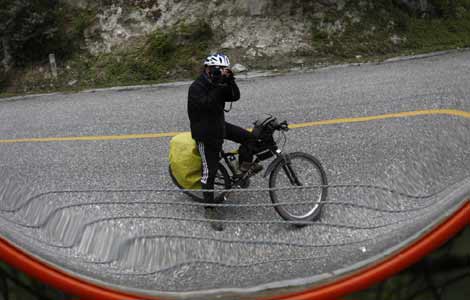Herdsmen sacrifice homeland for spaceflight base
Updated: 2011-09-30 11:29
(Xinhua)
|
|||||||||
Return
Half a century later, Chagan moved into a building in the city." But none of my dreams were related to the city, all of them were about the grassland. I always dreamed of herding sheep on the back of a horse," Chagan said.
Her memories of her homeland are still crystal clear. "We had eight lakes. Whenever I dug into the sand, water sprang out. There were fish in the lakes where birds flew above. I remember one kind of bird could sing a magic song to make bubbles in the lake, but no one had ever seen the bird."
"For Mongolians, their birthplace is a golden cradle, which can never be abandoned," she said.
Nanselma said she has kept contact up with people from the satellite base after she moved out. "The relationship between the herdsmen and base workers are generally good," she said.
In the 1970s and early 1980s when daily necessities were insufficient, the herdsmen went to buy goods in stores at the base. They also provided sheep dung as fertilizer for the base's farms. Women were sent to the base hospital if they had difficult births. The base workers also helped herdsmen to build houses and screened movies for them to watch.
However, it was not until 2008 that Nanselmahad caught her first glimpse of the launching tower.
"Although I was close with the people in the base, but I thought the tower was a secret so I prefer not to go there by myself," she explained. In 2008, an official of Ejinaa took Nanselma and other people to visit the tower for the first time.
"The tower is so sophisticated to me. The base staff arranged a banquet and explained the country's space program to us. At that moment, I realized that we have contributed greatly to the space exploration despite we have experienced so many hardships. I felt comforted," she said.
After the visit, Nanselma determined to organize a return activity for more Mongolians of her tribe in July 2010.
"At the very beginning, I only invited some 200 middle-aged people who were born during the journey, but eventually more than 700 people joined. The aged were assisted by the young. Some of them used crutches or sat in wheel chairs," she said.
It was the first time the herdsmen came back together to their homeland, where they saw rows of alamo, red brick buildings, clean streets and huge machines, but no signs of their original homes.
"When I saw the launching tower erected on the dreamland where I used to herd, tears rolled down my face," Chagan said.
"Workers told me about the significance of the space program. They had sent one person into the space, then two, then three...The country is developing fast, I'm happy and watching. The satellites and spacecraft can protect the nation from the high sky and enable the herdsmen to listen to the radio on the grassland," she said.
Nuomuhan said he felt worthy for all of the tribulation when he saw the achievements. "There had been trees, rivers and lakes, now they have all become a magnificent city. But for the herdsmen, they lost their land and properties," he said.
The Qiangchibunamdling Monastery was returned to the herdsmen in 1984 as the base reduced its warning limit area. In 2009, the Ejina banner government invested 600,000 yuan ($93,750) to repair the temple. The local Buddhists also raised a fund of 200,000 yuan ($31,250) to restore Buddha figures. Buddhist activities gradually resumed.
Luozi, a young lama in Qiangchibunamudling Monastery, chanted Buddhist sutras for herdsmen everyday. He said he could see rocket launch near the temple.
The former machinery automation student believed that space exploration could "open people's minds and stimulate intelligence."
At the same time, many herdsmen still feel puzzled about the whole story. "We gave our beautiful Ejina land to the space city, but it was called Jiuquan, the name of a city in Gansu province. I do not know why. Maybe they still want to keep it a secret?" Kungar said.










